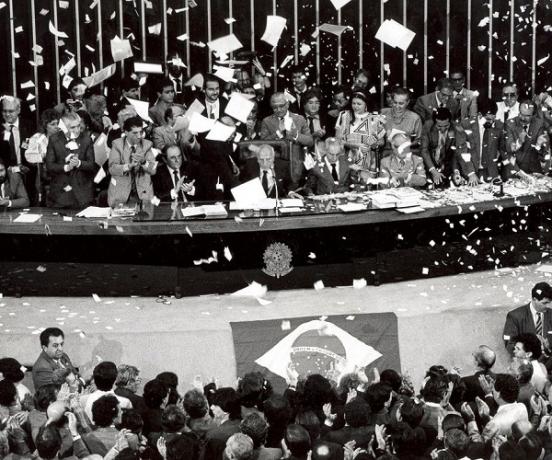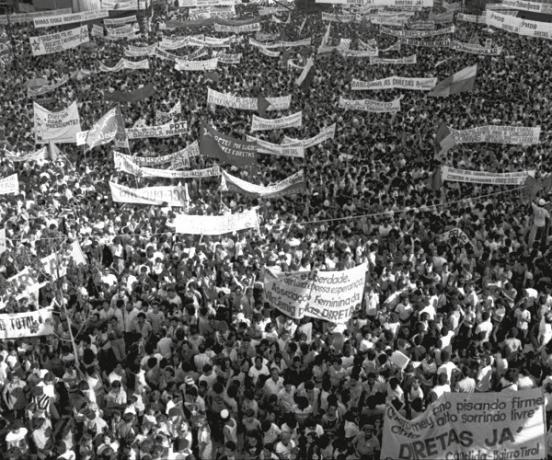Citizenship is the right to enjoy the rights and freedoms that are guaranteed to all people. It's the ability to power exercise your civil, political and social rights. and being able to have access to a life with respect for the rights guaranteed in the Federal Constitution.
In Brazil, the struggle for the exercise of full citizenship is linked to various events and social movements and some of these have been marked in the country's history. Discover now some of the most important moments for citizenship in Brazil.
1. the abolition of slavery
Slavery ceased to exist in Brazil on May 13, 1888, after the signing of the Lei Áurea. The law was approved and signed by Princess Isabel, one of the heirs of the Imperial Family who ruled the country at that time.
A few years before the signing of the law, there were already movements in the country that defended the end of slavery. However, as slaves were a very important part of the labor force in the agricultural production system at the time, the end of permitting slavery did not come so easily.
One fact deserves to be highlighted: the law determined the end of slavery and the purchase and sale of slaves, but it did not mean the immediate end of the exploitation cycle. Even with slavery officially banned, the law was not strong enough to contain other forms of abuse, such as precarious working conditions.
2. Promulgation of the Federal Constitution of 1988
 Promulgation of the Federal Constitution of 1988.
Promulgation of the Federal Constitution of 1988.
The enactment of the Federal Constitution of 1988 is one of the great milestones in the history of Brazilian citizenship. The Constitution is of great importance because it guaranteed various rights to citizens, in addition to protecting the principles of democracy and the rule of law. For all these reasons the Constitution of 88 was known as the Citizen Constitution.
The promulgation of the document took place on October 5, 1988 and was the result of a process of redemocratization in the country, which began at the end of the military dictatorship, in 1985.
The formation of the Constituent Assembly that gave rise to the new Constitution of Brazil was influenced by social movements that gained strength in the country during the dictatorship.
The Constituent Assembly operated for a year and seven months, from February 1987 to September 1988, and was presided over by federal deputy Ulysses Guimarães (1916-1992).
3. Winning Women's Vote
 Beginning of female participation in Brazilian elections.
Beginning of female participation in Brazilian elections.
On February 24, 1932, women officially conquered the right to vote in Brazil. Until that date, the right to participate in elections was exercised exclusively by men. The achievement came with the publication of the Electoral Code this year, during the government of President Getúlio Vargas.
For two years, female suffrage was only allowed for married women who had authorization from their husbands or for single women who were responsible for their own support.
A few years later, in 1946, with the promulgation of the new Federal Constitution, the right (and duty) to vote was expanded, without restrictions, to all women.
The right to vote is a very important social achievement, as the right to participate in the electoral process is fundamental for the full exercise of political rights.
The date is so important that, in 2015, the 24th of February was defined as the commemorative date Women's Vote Conquest Day in Brazil.
4. The Consolidation of Labor Laws
 Announcement of the creation of the Consolidation of Labor Laws.
Announcement of the creation of the Consolidation of Labor Laws.
The Consolidation of Labor Laws (CLT) is also an important milestone for citizenship because it guaranteed labor rights that were not recognized at the time of its publication. The CLT is important as it is a mechanism for protection against violation of rights which are guaranteed to workers.
The emergence of the law was responsible for the systematization of guarantees in labor relations, defining rights and obligations of employers and workers.
The CLT was enacted during the government of President Getúlio Vargas, on May 1, 1943. The document is called Consolidation because it was the first time that the labor legislation that already existed was organized and brought together in a single document.
See the main labor rights that are regulated in the CLT:
- employment contract,
- signature of the work card,
- working day,
- overtime pay,
- dismissal, notice and just cause,
- holiday regulations,
- maternity leave and paternity leave.
5. criminalization of racism
In 1989, racism came to be considered crime in Brazil. The publication of Law No. 7,716/89 was an important step towards guaranteeing citizenship, even though the law is little applied and racial discrimination persists in many situations.
The law provides that discriminatory attitudes or those motivated by prejudice (racial, ethnic or nationality) will be punished with imprisonment. The penalty can vary between one and five years, depending on the seriousness of the act committed.
The approval of the law reinforces an important concept in the fight against racism in Brazil, as the Federal Constitution determines that this crime is considered imprescriptible and unbailable.
Impedible means that the act of discrimination and the possibility of penalization do not cease to exist over time, and there may be judgment and punishment at the time the complaint.
Unbailable means that the perpetrator of a crime of racism cannot be released from prison by paying bail.
See the examples of social movements.
6. Direct Movement Already
 Demonstration for direct elections for president - Diretas Já (1983/1984).
Demonstration for direct elections for president - Diretas Já (1983/1984).
Diretas It was the name given to a political movement that took place in Brazil in the early 1980s, between 1983 and 1984. The movement emerged as a popular outcry for return of direct elections for President of the Republic.
When the movement emerged, Brazil was still in the final years of the military dictatorship, which lasted from 1964 to 1985. During the dictatorship there were no direct elections with the participation of the population and the presidents were chosen by the military who commanded the country.
As a reaction to the lack of democracy in the presidential choice, the Diretas Já movement was formed, which protested for the return of direct elections. The movement was made up of citizens, political parties and various personalities, such as artists, politicians and intellectuals.
Despite having gained a lot of strength, with the realization of several public acts and demonstrations, the movement did not obtain success and the 1985 elections took place through the indirect voting system, in which the president was chosen by a college. electoral. This year Tancredo Neves was elected the new president.
The first direct election for President of the Republic after the end of the military dictatorship only took place four years later, in 1989, with the election of Fernando Collor de Mello.
Read more about what is citizenship, important moments in the struggle for democracy and ways to exercise citizenship.
See also the meaning of the Brazilian Flag Day.
